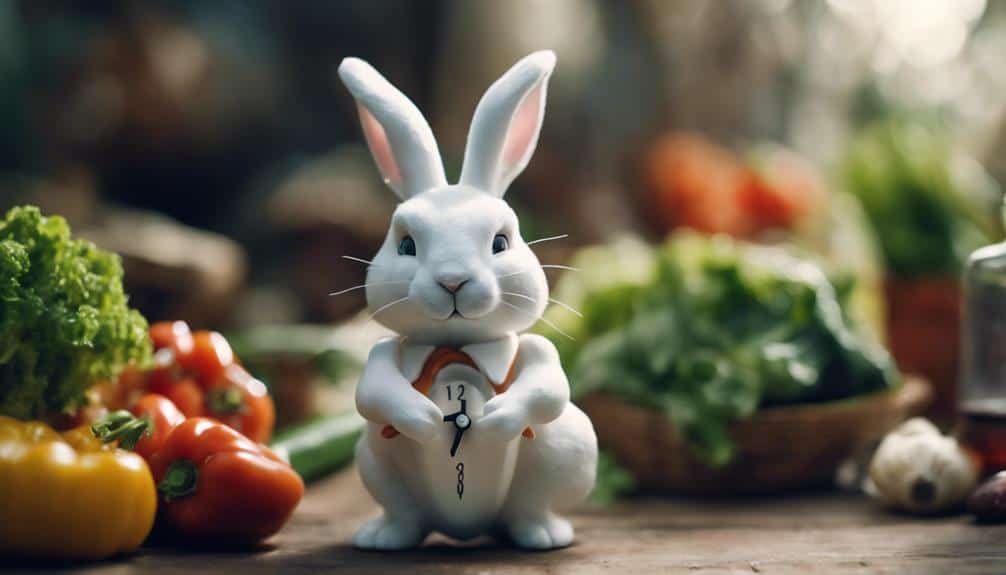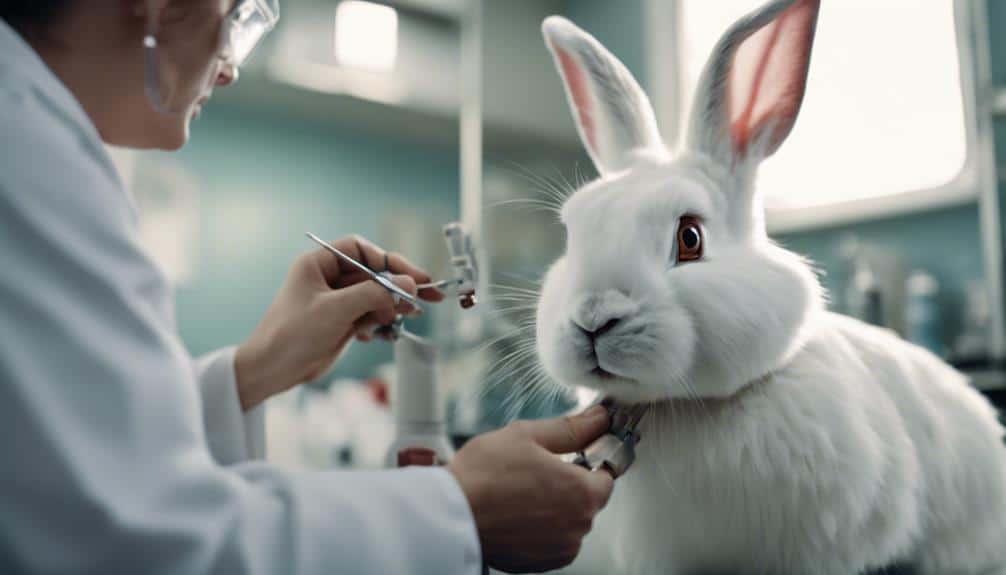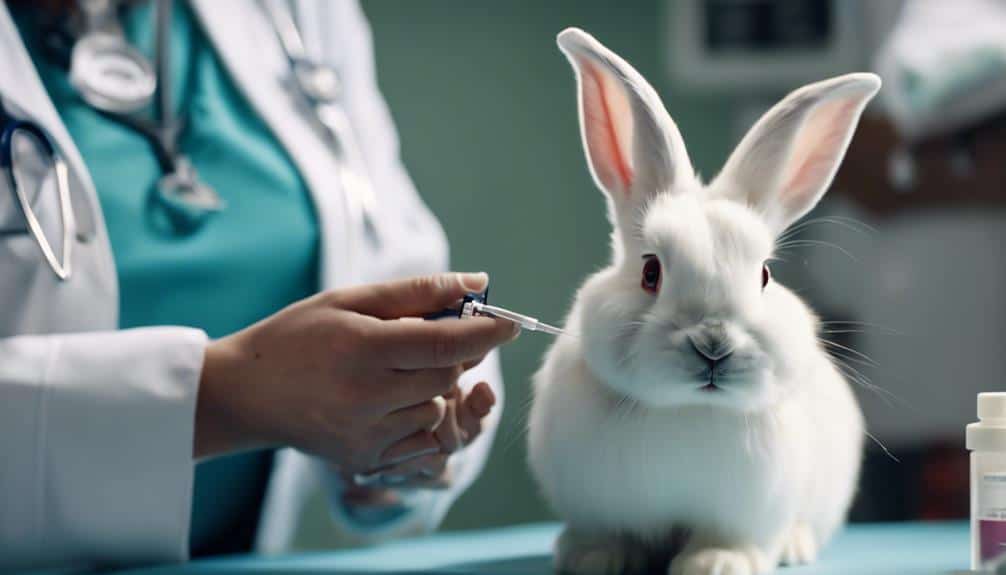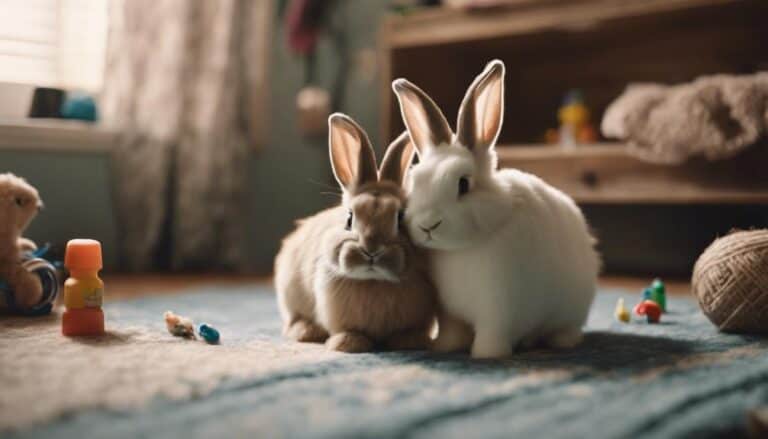Ever wondered about the life span of a white rabbit? It's pretty interesting to think about the factors that influence how long these adorable creatures can live.
Diet, exercise, genetics, and habitat are just a few of the many elements that come into play.
But what exactly determines whether a white rabbit will have a shorter or longer life span?
Let's take a closer look at the intricacies that shape the longevity of these fluffy companions.
Contents
Key Takeaways
So, you're wondering about the life span of a white rabbit? On average, Florida White rabbits can live for around 5 to 8 years. But, there are some key things you can do to help your rabbit live a long and healthy life.
First, diet is crucial. Your rabbit needs a high-fiber diet to stay healthy. Then, regular veterinary care is essential, including regular dental check-ups. Rabbits need their teeth checked regularly to prevent health problems.
Exercise and mental stimulation are also vital for your rabbit's overall health and well-being. You can provide toys and activities to keep your rabbit active and engaged. Finally, socialization and companionship are super important for a rabbit's happiness and longevity. Rabbits are social animals and need to interact with their human family members or other rabbits to thrive.
Rabbit Lifespan Factors

The factors that affect how long a white rabbit lives are not limited to their breed or genetics. Nutrition, exercise, and the environment they live in also play a big role in determining their lifespan.
For example, the Florida White rabbit can live for 5 to 8 years, which is pretty long for a rabbit. This just goes to show that having good genes is important, but it’s not the only thing that matters. If a rabbit eats a balanced diet and gets regular exercise, it can live a lot longer than one that doesn’t. In fact, while the Florida White rabbit boasts an impressive lifespan, the average lifespan of pet rabbits can vary significantly based on factors such as breed, care, and environment. Owners who prioritize their pet’s health by providing proper nutrition, mental stimulation, and veterinary check-ups can greatly enhance their rabbits’ well-being. Ultimately, a loving and attentive caretaking approach can make all the difference in ensuring that these furry companions lead long, happy lives.
Domestic rabbits like the Florida White have it easier than wild rabbits, who've to deal with all sorts of dangers. That's why domestic rabbits can live for 8 to 12 years, while wild rabbits usually don't make it past 2 to 3 years. The breed of rabbit also makes a difference. Larger breeds tend to live shorter lives, while smaller breeds like the Florida White can live longer.
Interestingly, purebred rabbits like the Florida White usually don't live as long as mixed breeds. But, every rabbit is different, and individual factors can affect how long they live. So, if you want to make sure your white rabbit lives a long and healthy life, it's essential to understand these factors and provide the best possible care.
Importance of Balanced Diet
A Florida White rabbit's lifespan largely depends on having a balanced diet that's rich in high-fiber content and essential nutrients.
To keep your rabbit healthy and thriving, it's crucial to provide a diet that meets their specific needs.
First and foremost, your rabbit needs a high-fiber diet. This is because fiber is essential for maintaining healthy digestion and preventing gastrointestinal issues like stasis. Quality hay, such as timothy hay or dried grass, is an excellent source of fiber and should be the main staple of your rabbit's diet.
In addition to hay, your rabbit will also benefit from moderate amounts of fresh vegetables and fruits. These provide essential vitamins and minerals, but be careful not to overdo it. Some fruits and veggies are high in sugar, fat, or salt, which can cause health problems if given in excess.
Lastly, make sure your rabbit always has access to clean water. Staying hydrated is vital for overall health and can help prevent urinary tract issues and dehydration.
Ideal Rabbit Housing

Rabbits need room to move around and exercise, so the enclosure should be at least four times the size of the rabbit. Ideally, it should be around 2x4x4 feet in size. This gives them space to hop, stretch, and explore, which is essential for their well-being.
Adding hiding places and toys can make their space more comfortable and help reduce their stress levels. But remember, the enclosure needs to be kept clean. Remove feces and soiled bedding every day, and do a deep clean every week to prevent diseases from spreading.
Temperature is also important. Keep the enclosure between 60-75°F to keep your rabbit healthy. The flooring is crucial too. Use thick yoga mats or rugs to prevent sore hocks. The bedding should be around 1-2 inches deep, and it's best to use paper-based bedding for comfort.
Make sure your rabbit always has access to clean water and food containers. If you provide these ideal housing conditions, you'll be ensuring your rabbit's well-being and longevity.
Significance of Companionship
Understanding the social nature of rabbits is key to appreciating the significance of companionship in maintaining their mental and emotional well-being. Rabbits are social animals that require interaction to thrive, and companionship plays a vital role in keeping them happy and healthy.
When it comes to mental stimulation, interacting with a compatible companion is a must. This prevents boredom and promotes a more enriching environment. Rabbits need something to do, and a friend can keep them engaged and active.
But companionship is more than just about mental stimulation. It also provides emotional support, which is essential for a rabbit's well-being. Rabbits have a natural instinct for social interaction, and when they don't get it, they can become stressed, anxious, or even develop behavioral problems.
Having a companion can also lead to better physical well-being. When rabbits have a friend, they engage in play and exercise together, which contributes to their overall health and happiness. It's a win-win situation for rabbits!
Role of Veterinary Check-ups

Regular veterinary check-ups are super important for keeping your white rabbit healthy. They're not just about getting vaccinations, but also about catching any health problems early on.
If you make vet visits a priority, you can get your rabbit treated quickly if they do get sick.
This can even help them live longer.
Importance of Check-Ups
Regular veterinary check-ups are a must for your white rabbit's health. They help detect potential issues early on, which means you can get your rabbit the treatment they need, and potentially even extend their lifespan. These check-ups provide essential preventive care and monitoring for your rabbit's overall well-being.
One of the main reasons regular check-ups are so important is that they allow veterinarians to identify health issues early on. For example, they can spot dental problems or respiratory issues that you mightn't notice otherwise.
Annual vaccinations are also crucial for preventing diseases in white rabbits. Regular check-ups ensure these vaccinations are given on time, which helps boost your rabbit's immunity.
Additionally, experienced rabbit veterinarians can offer valuable guidance on how to properly care for your rabbit, including advice on nutrition and answering any questions you may have. This helps you provide the best possible care for your white rabbit.
Preventive Health Measures
Taking care of your white rabbit's health is crucial, and regular veterinary check-ups are a big part of that. These check-ups are essential for maintaining your rabbit's overall well-being. The thing is, rabbits are experts at hiding signs of illness, so it's vital to catch any potential health issues early on. That's where regular veterinary check-ups come in.
Through these check-ups, your vet can identify any health problems early, which makes a huge difference. On top of that, annual vaccinations are a must. They help prevent various illnesses and diseases that can affect your rabbit. By keeping up with regular check-ups, you can make sure your rabbit's vaccinations are up-to-date, giving them the protection they need.
Let's take a look at why preventive health measures are so important:
| Preventive Health Measures | Benefits |
|---|---|
| Regular Veterinary Check-ups | Early detection of health issues |
| Annual Vaccinations | Prevention of illnesses and diseases |
| Experienced Veterinarian Care | Detection of hidden health problems |
| Guidance on Rabbit Care | Improved quality of life |
Early Disease Detection
Keeping your white rabbit healthy requires keeping a close eye out for early signs of disease. One key way to do this is by taking your rabbit to the vet regularly. These check-ups are crucial for making sure your rabbit stays healthy.
Regular vet visits can catch health problems early, before they become big issues. Rabbits are experts at hiding signs of illness, so it's essential to catch these problems early so you can treat them effectively.
Vaccinations are also a big part of keeping your rabbit healthy. Annual vaccinations can prevent common illnesses that can be deadly for rabbits. By taking your rabbit to the vet regularly, you can make sure they get these vaccinations on time and stay protected.
A vet who's experienced in caring for rabbits can spot health problems that you mightn't notice. They can identify issues like dental problems or respiratory troubles, and help you take action early on. This can lead to better outcomes for your rabbit.
Mental Stimulation for Rabbits
So, you want to keep your rabbit happy and healthy, right?
Engaging in enrichment activities is key to promoting their mental well-being.
Think about it, rabbits can get bored just like us.
Interactive toys like cardboard rolls and puzzle feeders can provide the mental stimulation they need to stay engaged.
This is essential for their overall health and happiness.
Rabbit Enrichment Activities
Engage your rabbit's mental faculties through a variety of enriching activities that stimulate their problem-solving skills and sensory exploration.
One way to provide mental stimulation is to offer a variety of toys and objects like cardboard boxes, paper bags, and untreated wood.
Rotating these items every few days can keep your rabbit engaged and curious about their surroundings.
This is because rabbits get bored with the same old thing, just like we do!
So, mix it up and give them something new to explore.
Another activity that's great for mental stimulation is food puzzles.
Hide your rabbit's food in a toy or object to create a challenge.
This activity challenges their problem-solving skills and provides mental stimulation while they work to retrieve their food.
It's like a fun little game for them!
Providing opportunities for sensory exploration is also important.
Introduce different textures, smells, and tastes to help stimulate your rabbit's mental health and keep them engaged in their environment.
This can be as simple as offering a new type of hay or letting them explore a new area of their enclosure.
The key is to keep things interesting and new!
Interactive Toy Options
Interactive toys are a great way to mentally stimulate your rabbit and prevent boredom and stress.
For example, puzzle toys that challenge your rabbit to solve a simple problem to get a treat can keep their minds engaged and active. Treat-dispensing toys are also super effective – not only do they provide a reward, but they also encourage physical activity as your rabbit interacts with the toy to get the treats. And let's not forget about chew toys, which are essential for maintaining healthy dental hygiene and satisfying your rabbit's natural urge to chew.
To keep things interesting, it's a good idea to offer a variety of toys and rotate them regularly. You don't have to break the bank, either – homemade interactive toys like cardboard boxes or paper bags can be just as effective.
Plus, incorporating toys that cater to your rabbit's natural behaviors, like digging and burrowing, can provide mental stimulation and prevent destructive behavior. For instance, tunnels and boxes can be a great way to channel their instincts in a positive way.
Mental Exercise Importance
Mental exercise is super important for rabbits. It's a key factor in preventing behavioral issues and keeping their mental health in top shape.
One way to do this is by introducing stimulating activities into their routine.
For instance, puzzle toys are a great way to challenge your rabbit's problem-solving skills and keep them entertained for a while. These toys help improve their mental agility and give them a sense of accomplishment when they figure them out.
Another idea is to incorporate scent games into their daily routine. Rabbits have a strong sense of smell, and by hiding treats or toys with distinct scents, you can encourage them to explore and engage their minds.
Playing hide-and-seek with your rabbit is also a fun way to promote mental exercise. By hiding objects or treats, you're encouraging them to search and think critically. This activity not only keeps their minds active but also helps strengthen the bond between you and your pet.
Vaccinations and Health Maintenance

Annual vaccinations and regular health check-ups are crucial for maintaining the well-being of white rabbits and preventing illness and disease.
Annual vaccinations play a vital role in protecting white rabbits from various diseases. Regular veterinary check-ups can help detect any health issues early on. By ensuring your rabbit receives its vaccinations on time and has regular visits to the veterinarian, you're actively contributing to its overall health and well-being.
So, why are vaccinations and health maintenance so important for white rabbits?
Annual vaccinations are necessary to prevent illnesses and diseases, such as myxomatosis, and protect from deadly infections. Regular veterinary check-ups are essential for early detection of health issues, monitoring overall well-being, and extending lifespan.
Preventing Dental Problems
Regular dental check-ups are a must for Florida White rabbits, as they're prone to overgrown teeth that can cause serious health issues if left unchecked.
Maintaining your Florida White rabbit's dental health requires a combination of proper diet and regular care. Make sure your rabbit has unlimited access to high-quality grass hay, which promotes natural teeth wear and helps prevent dental problems.
Regular teeth trimming is also essential. Florida White rabbits' teeth continuously grow, and if not managed properly, can lead to dental issues.
A balanced diet plays a crucial role in maintaining your rabbit's dental health. Offer a well-rounded diet consisting of limited rabbit pellets, a variety of fresh vegetables, and fruits. This balanced nutrition contributes to overall dental health and reduces the risk of dental problems.
Conclusion
The life span of a white rabbit depends on several factors.
Diet plays a huge role. If you're feeding your rabbit a balanced diet, they're more likely to live a longer, healthier life.
Housing is also important – your rabbit needs a safe, comfortable place to live.
Companionship is another key factor. Rabbits are social creatures, so they need to interact with other rabbits or even with you, their owner.
Veterinary care is also crucial – regular health check-ups can help catch any health issues before they become serious problems.
Finally, mental stimulation is vital. Rabbits need things to do and explore to keep their minds active and healthy.
If you can provide all of these things, you can help your white rabbit live a long, happy life.






